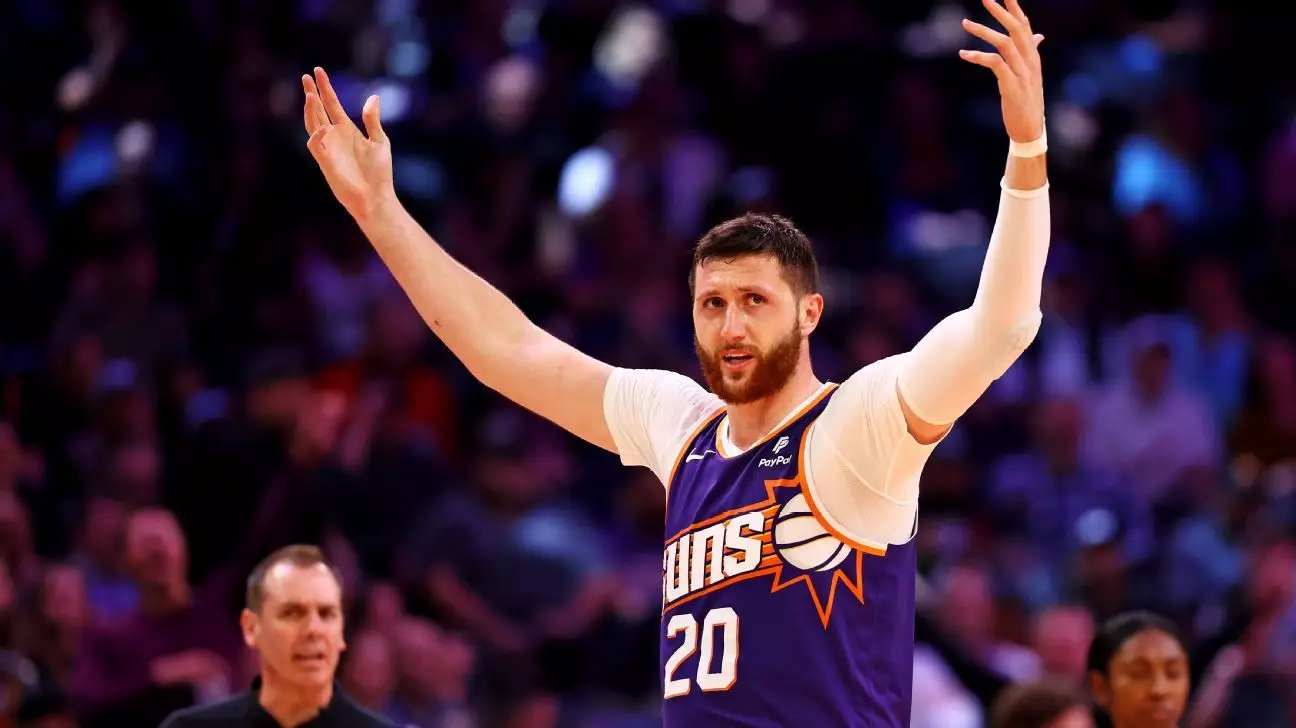The Phoenix Suns, a team with championship aspirations, find themselves embroiled in a dilemma involving center Jusuf Nurkic. After expressing dissatisfaction with his role under head coach Mike Budenholzer, Nurkic has voiced significant concerns about his relationship with the coaching staff and his current standing on the team. This narrative unfolds not merely as a tale of a player relegated to the bench but rather as a deeper story reflecting the complexities of team dynamics, player-coach relationships, and the oft-unforgiving nature of professional sports.
In an unexpected turn of events, Nurkic recently revealed that he hasn’t communicated with Budenholzer in over two months, stating bluntly that they “don’t have a relationship.” This kind of disconnect between a player and head coach can signal larger issues within a team. Good relationships between coaches and players are vital for cultivating an environment conducive to success. When players feel sidelined due to a lack of communication, it can lead to frustration—not just for the individual, but for the team as a whole. Nurkic’s stark admissions illustrate a rift that could have repercussions for the Suns, particularly if the situation does not improve.
What adds another layer of complexity to Nurkic’s predicament is the fact that he has not played since January 7, marking his absence from an ongoing stretch that is beginning to test the limits of his professionalism. His statement, “just be a pro and do the best I can,” encapsulates the struggle many players face when dealing with unexpected roles or diminished playing time. Nurkic’s self-professed commitment to professionalism even amidst distress highlights the demand for resilience faced by athletes at the highest level.
The transition Nurkic has undergone this season—moving from starting 23 games to riding the bench—has left many puzzled. His comments regarding not being informed about not playing in a recent game against the Atlanta Hawks are indicative of the communication breakdown within the team’s management. Competition in the NBA is fierce, and players must remain adaptable to changing circumstances, but being blindsided by such decisions can lead to a sense of disillusionment.
Nurkic’s frustration is further rooted in the abrupt nature of his demotion. This is not the first time he has faced such transitions in his career; his previous stint in Denver also saw him relegated to a lesser role as Nikola Jokic began to emerge as a star. The notion of a fresh start in Phoenix was presumably welcomed by Nurkic, yet the unforeseen changes in coach Budenholzer’s rotation may have dashed his hopes for a sustaining contribution to the team’s success.
With Nurkic sitting out games and other centers taking on pivotal roles, Budenholzer has actively navigated this coaching challenge by experimenting with different line-ups. However, such rapid rotations can produce both excitement and confusion among players. When asked about his views on the other centers, Nurkic demonstrated remarkable professionalism, indicating that he harbors no ill will towards players like Mason Plumlee or Nick Richards. This level of understanding is conspicuous, revealing that he recognizes the intrinsic nature of the NBA: performance speaks volumes, a lesson that has seemingly not eluded him.
Budenholzer’s response to Nurkic’s dissatisfaction is both a practical acknowledgment of the situation and an implication of the competitive nature of basketball. He emphasizes the need for players to “earn” their minutes, yet this raises questions about the fairness and transparency of the criteria being used to allocate playing time. The balancing act of managing player morale while securing wins can be immensely difficult for coaches, especially with a talent pool as varied as that of the Suns.
Despite the turmoil, Nurkic remains optimistic about his future with Phoenix. Transferred to the team in a comprehensive three-team trade prior to the 2023-24 season, Nurkic initially showed promise, posting respectable averages. His recent words hint at a potential belief that both he and the team can find resolution before the impending trade deadline. “One door closes, another will open eventually,” he asserts, exemplifying the hopeful outlook many professional athletes maintain amid tumultuous circumstances.
This situation not only magnifies Jusuf Nurkic’s current standing but serves as a broader commentary on the volatile landscape of the NBA. The ongoing relationship between a player and coach is a symbiotic one, often entangled with emotional intricacies that significantly impact team dynamics. As the season progresses, how both Nurkic and Budenholzer navigate this relationship may very well determine the future trajectory not just of Nurkic’s career, but of the Phoenix Suns as a whole.

